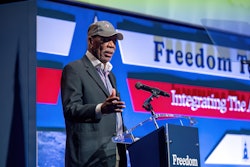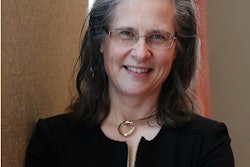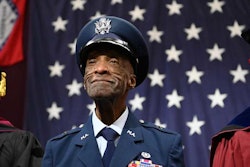In July 2013, Cheryl Boone Isaacs, an American film marketing executive, was named president of the Academy of Motion Pictures of Arts and Sciences. She was the first African-American (and only third woman after actresses Bette Davis and Fay Kanin) to be selected to lead the organization. Several decades earlier in 1939, Hattie McDaniel became the first Black person to win an Oscar for her performance in the classic movie Gone With the Wind. Her victory was bittersweet in that her speech was prepared for her and she and her guests were forced to sit in a segregated section of the building where the event took place.
These two similar, yet distinctive, examples are representative of the complex relationship between African-Americans and the Oscars.
While McDaniel’s nomination and victory for best supporting actress was significant by any standard and commendable, it was not until a decade later in 1949 that another Black actress, Ethel Waters, was nominated for best supporting actress for her performance in the movie Pinky. Unlike McDaniel, Waters was unsuccessful in her quest to win an Academy Award. In 1954, jaw droppingly beautiful Dorothy Dandridge was the first Black woman nominated for best actress in a lead role for her performance in Carmen Jones. The Oscar that year went to Grace Kelly for her performance in The Country Girl. It was not until 1958 that a Black male, Sidney Poitier, was nominated for an Oscar. He portrayed a convict in The Defiant Ones. Poitier also was nominated in 1963 and became the first Black man to win an Oscar as well as the first to win as best actor for his lead role as a carpenter assisting a group of Arizona nuns in Lilies of the Field.
The ceremony itself grew in stature. From its origin as a small dinner party of a few actors and actresses, movie executives and producers in 1927, the Oscars soon moved to ceremony status in 1929. Along with spectacles such as the Miss America Pageant, Super Bowl, Grammy Awards, etc., it has remained one of the most popular and watched annual events by Americans as well as viewers throughout the entire world. It has captivated millions.
Over the following several decades, a number of African-Americans were sporadically nominated for roles ranging from boxers to sharecroppers, to drug addicts, to welfare mothers to abused or scorned women, maids, psychics, drug dealers, prisoners, single mothers, gifted children, diplomats, presidents, dictators, domestics, musicians and famous people,
By the early 1980s, the Hollywood branch of the NAACP criticized the academy for what it saw as a routinely chronic lack of Black nominees. Louis Gossett Jr. won an award in 1982 for his role as a tough drill sergeant in the movie An Officer and a Gentleman. Interestingly, during the mid-1980s, The Color Purple, a film directed by Stephen Spielberg and based on the 1983 Pulitzer Prize-winning novel by Alice Walker, was nominated for 11 Academy Awards. The film became a lightning rod of controversy and set off a number of heated and passionate debates in the Black community, particularly for its less than stellar depiction of Black men. In fact, even conservative publications such as the National Review denounced the film, stating that there were not any Black men in the movie that had any admirable or redeeming qualities.
Despite its multiple nominations and the abundance of attention it garnered—in fact, it was the first time that multiple Black actresses Oprah Winfrey, Margaret Avery and Whoopi Goldberg received nominations for the same film—the movie failed to win any Oscars and held the record along with the 1977 movie The Turning Point as the most nominated films failing to win any Oscars. What made this fact even more interesting (arguably amusing) was that many of the same people, including the Hollywood branch of the NAACP, who were critical of the movie “threatened to sue” the academy for failing to award any Oscars to the movie. There is no doubt that such a suit would have been unsuccessful. Moreover, such a schizophrenic reaction was not the finest moment for the NAACP.
In 1987, Hollywood mega superstar Eddie Murphy took the academy to task for what he saw as the lack of recognition given to Black performers in the movie industry before giving the award for best picture that year.
During the 1990s, Black actors were increasingly being nominated for their performances by the Academy with Goldberg, Denzel Washington, Angela Bassett, Laurence Fishburne and Morgan Freeman among them. Goldberg would become the second Black woman to win an Oscar for her role as the psychic medium in Ghost. By the 21st century, Black nominees have been a staple in the Oscar circuit. In 2001, a year dubbed by a number of Blacks (and non-Blacks) as “the year of the Black Oscars,” the academy honored Poitier with a lifetime achievement award. Washington, Will Smith and Halle Berry were also nominated for best actress/actor. Berry and Washington were victorious, and Berry would become the first Black woman to win best actress.
Later years would see Jamie Foxx (who became the first Black nominee to receive two nominations in the same year). He won the Academy Award for his spellbinding performance in the movie Ray. Freeman, Forrest Whitaker, Jennifer Hudson, Octavia Spencer and Mo’Nique have also taken home Hollywood’s most coveted honor.
2013 was a very good year for Black film and actors. A number of nominees—Chiwetel Ejiofor, Lupita Nyong’o, Barkhad Abdi—have been nominated in the best actor and supporting actor and actress categories and Black British director Steve McQueen has been awarded with a best director nod. If he wins, McQueen will be the first Black person to win in this category. Recent ads promoting the movie Twelve Years a Slave with the slogan “it’s time” unapologetically reinforce this message.
Whatever your opinion, the fact is that the Oscars have been a mainstay in American popular culture and have been influential in the lives of a number of Black entertainers, and I, like millions of people all over the world, will be tuning in Sunday to see who will take home an Oscar.


















